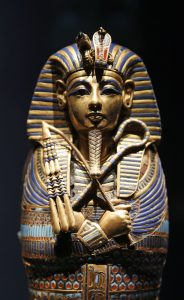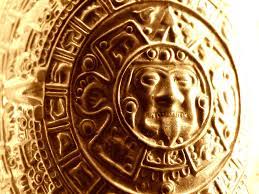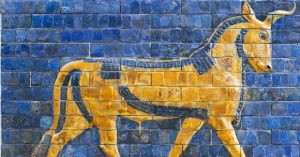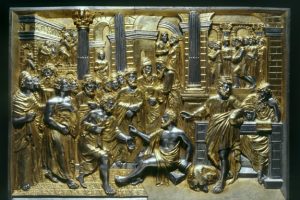
From the beginning of time, gold has held an almost magical hold on people. Since the time of the Pharaohs, this yellow metal was used as a form of currency, as well as to adorn the capstones on the pyramids of Giza. In grade school we learned about the Egyptian royal burial of King Tut (Tutankhamun) and his solid gold sarcophagus. But did you know that even the wives of the Pharaohs were interred with golden jewelry, such as necklaces, collars, belts, pendants, and even gold sandals made of hammered gold sheets?

The ancient Greeks used gold as a societal status symbol. Thus it was viewed as a sign of wealth and power. And just like their neighbors to the south, the Egyptians, they used it as currency. And when a society highly values something like a commodity they typically deify it with supernatural powers similar to the way the Greeks did with gold. Remember the legends of gold that’ve cultivated Greek mythology, such as the Golden Fleece stolen by Jason and the Argonauts, as well as King Midas’s golden touch. The Romans, who inherited similar legends only to rename them, also saw inherent worth in this precious and practical mineral used extensively as currency.

The Aztecs and Incas also highly valued this shiny metal incorporating it into their religious ceremonies and architectural designs. Modern day Mexico traces its ancestral roots to the time of the Aztecs. They too highly esteemed the yellow metal mined and panned from streams. We were also taught in school that Hernán Cortés and his band of Spanish conquistadors eventually raided thousands of pounds of Aztec gold, silver, jewels, and art. Around the same time, the Spanish conquistador Francisco Pizarro invaded the Inca Empire, known as modern day Peru, eventually taking over their land and vast quantities of gold.

Jewish kings, such as Solomon, adorned their palaces with gold and even their drinking vessels were made of pure gold (see 1 Kgs 10:21). Remember the ark of the covenant–the wooden chest that housed the two stone tablets of the Ten Commandments, as well as a golden urn holding manna (from the wilderness) and Aaron’s rod that budded? That too was covered in refined gold on all sides, inside and out (see Ex 25: 10-22; Heb 9:4).

And let’s not forget about the Gold Rushes of North America, including the Yukon (Klondike River), California (San Francisco), and North Carolina, as well as Australia (Outback). Gold miners, prospectors and adventurous families left their security of home to migrate thousands of miles over land and/or by sea to “stake their claim” and “strike it rich.” Only gold could entice people to do that, especially when only one third of those people would survive the expedition.

Gold, unequivocally, has been treasured in almost all ancient and now modern civilizations. For a sundry of reasons, gold has held a spellbinding hold on humans. For its malleability, untarnishability, scarcity, monetary worth, aesthetic properties and its association with supernatural powers, gold weighs heavy in the human psyche. So we’ve seen that gold has been richly regarded all throughout history. But should it be the most valuable commodity? By comparison, the Bible de facto says, “no!”

There’s nothing innately bad or evil about gold. But like any other commodity it can become an idol (see Ps 115:4) of which we obsess over to the point of eclipsing more important “commodities,” such as faith. Be careful not to “sell your soul” over earthly treasures, such as gold. Assuredly, when we use the words “idol” and “gold” in the same sentence, we’re immediately ushered into the story of Aaron fashioning a golden calf for the Israelites (see Ex 32:1-4), whom God saved by bringing them out of Egypt, although they claimed that it was the calf made of gold jewelry that was responsible for saving them from Egyptian bondage.

This is what Scripture has to say about the relationship between faith and gold: “So that the tested genuineness of your faith—more precious than gold that perishes though it is tested by fire—may be found to result in praise and glory and honor at the revelation of Jesus Christ” (1 Pt 1:7, ESV).

The Bible also uses the analogy of wisdom and silver/gold/rubies to show how wisdom is significantly and substantially superior: “Choose my instruction rather than silver, and knowledge rather than pure gold. For wisdom is far more valuable than rubies. Nothing you desire can compare with it” (Prov 8:10-11, NLT).

But it begs the question, “Why wisdom? What do we get for sacrificing material possessions?” The author of Proverbs says proudly that it’s happiness! “Happy is anyone who becomes wise—who comes to have understanding. There is more profit in it than there is in silver; it is worth more to you than gold. Wisdom is more valuable than jewels; nothing you could want can compare with it” (Prov 3:13-15, GNT). It’s important to note that this concept of happiness is not merely the subjective feeling of an emotion but the objective state of wellbeing that comes with healthy emotions, such as joy.

The Psalmist reminds us of the importance of divine commands or laws above the finest gold: “…I love your commandments above gold, above fine gold” (Ps 119:127, ESV) and “…The laws of the LORD are true; each one is fair. They are more desirable than gold, even the finest gold….” (Ps 19:9-10, NLT).

It’s encouraging to remember the words of the Apostle Peter to the lame man who begged at the temple gate called Beautiful. Day after day, the burdened fellow would be carried there to beg for some commodity, something to get him through the day, possibly gold or silver. But Peter offers him something far more valuable: “I have no silver and gold, but what I do have I give to you. In the name of Jesus Christ of Nazareth, rise up and walk!” (Acts 3:6, ESV)

Obviously, gold is precious. But why stop there? Gold is merely a standard by which we measure something much, much more precious–our faith, wisdom, God’s laws and the precious gift of His Son!
022020